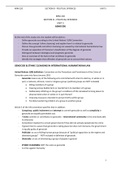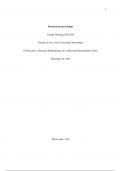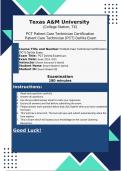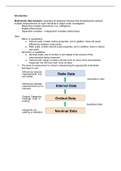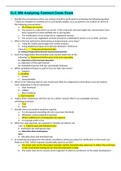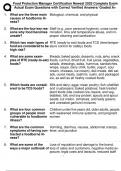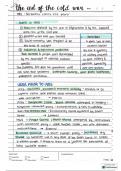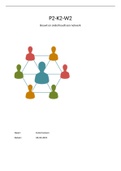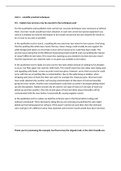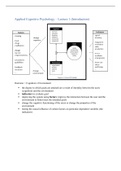KRM 220 SECTION B – POLITICAL OFFENCES UNIT 5
KRM 220
SECTION B – POLITICAL OFFENCES
UNIT 5
GENOCIDE
At the end of this study unit, the student will be able to:
- Define genocide according to the United Nations’ (UN) Convention
- Define the concept ‘ethnic cleansing’ and explain how it is related to genocide
- Discuss how genocide and ethnic cleansing are viewed by international humanitarian law
- Provide an exposition of Pramono’s classification of the degrees of genocide
- Distinguish between ideological and pragmatic genocide
- Give an overview of the factors that contribute to genocide
- Identify the strategies that offenders of genocide use to conceal their actions
GENOCIDE & ETHNIC CLEANSING IN INTERNATIONAL HUMANITARIAN LAW
United Nations (UN) definition: Convention on the Prevention and Punishment of the Crime of
Genocide came into force January 1951
- Genocide means any of the following acts committed with intent to destroy, in whole or in
part, a national, ethnical, racial or religious group: (political groups are NOT included)
Killing members of a group
Causing serious bodily harm or mental harm to members of a group
Deliberately inflicting on the group’s conditions of life calculated to bring about its
physical destruction in whole or in part thereof
Imposing measures intended to prevent births within group
Forcibly transferring children of a group to another group
Article 3 of the UN convention specifies that in addition:
- Conspiracy, public incitement and attempt to commit genocide as well as complicity in
genocide are equally punishable acts
- If state commits or contributes to genocide – international community is the only body able
to intervene
- Convention impotent to convict governments if they did not actively perpetrate the crime
- If government is aware that genocide is taking place but does not intervene, the government
is equally guilty of genocide
- Politicide: an act of killing human groups because of “political opposition to the regime and
dominant groups” - NOT included in definition of genocide
- Democide: an act of eliminating a group of people in general
- ETHNIC CLEANSING: NOT the same as genocide
- A crime against humanity
1
KRM 220
SECTION B – POLITICAL OFFENCES
UNIT 5
GENOCIDE
At the end of this study unit, the student will be able to:
- Define genocide according to the United Nations’ (UN) Convention
- Define the concept ‘ethnic cleansing’ and explain how it is related to genocide
- Discuss how genocide and ethnic cleansing are viewed by international humanitarian law
- Provide an exposition of Pramono’s classification of the degrees of genocide
- Distinguish between ideological and pragmatic genocide
- Give an overview of the factors that contribute to genocide
- Identify the strategies that offenders of genocide use to conceal their actions
GENOCIDE & ETHNIC CLEANSING IN INTERNATIONAL HUMANITARIAN LAW
United Nations (UN) definition: Convention on the Prevention and Punishment of the Crime of
Genocide came into force January 1951
- Genocide means any of the following acts committed with intent to destroy, in whole or in
part, a national, ethnical, racial or religious group: (political groups are NOT included)
Killing members of a group
Causing serious bodily harm or mental harm to members of a group
Deliberately inflicting on the group’s conditions of life calculated to bring about its
physical destruction in whole or in part thereof
Imposing measures intended to prevent births within group
Forcibly transferring children of a group to another group
Article 3 of the UN convention specifies that in addition:
- Conspiracy, public incitement and attempt to commit genocide as well as complicity in
genocide are equally punishable acts
- If state commits or contributes to genocide – international community is the only body able
to intervene
- Convention impotent to convict governments if they did not actively perpetrate the crime
- If government is aware that genocide is taking place but does not intervene, the government
is equally guilty of genocide
- Politicide: an act of killing human groups because of “political opposition to the regime and
dominant groups” - NOT included in definition of genocide
- Democide: an act of eliminating a group of people in general
- ETHNIC CLEANSING: NOT the same as genocide
- A crime against humanity
1

